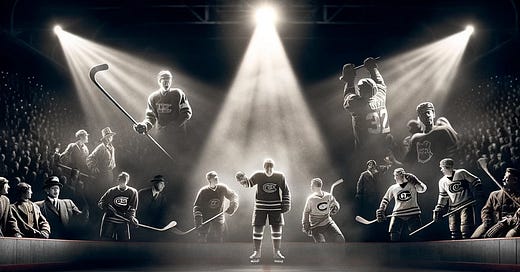On This Day: The Birth of a Legacy - NHL's Inaugural Season Begins
On December 19th, 1917, a pivotal moment in sports history unfolded as the National Hockey League (NHL) launched its inaugural season, forever altering the landscape of professional ice hockey. This historic day marked the league's debut with four pioneering teams: the Montreal Canadiens, Montreal Wanderers, Ottawa Senators, and Toronto Arenas. These initial squads laid the foundation for what would become a monumental sports league, introducing a new level of professionalism and excitement to the world of ice hockey.
The early games of the NHL were characterized by a raw, unrefined style of play, a stark contrast to the polished game we know today. The first matchups were gritty and intense, reflecting the passion and determination of the players amid the novelty of the professional league format. The arenas, significantly smaller than today's massive venues, resonated with the sounds of clashing sticks and skates carving the ice, creating an electrifying atmosphere that captivated the fans. Spectators, many experiencing professional hockey for the first time, were enthralled by the sheer energy and competitiveness on display, forming a bond with the sport that would endure for generations.
One notable moment from these early games was when Joe Malone, playing for the Canadiens, dazzled the crowd with his exceptional scoring ability, setting an early standard for individual excellence in the league. Similarly, the Wanderers, despite facing challenges that would soon lead to their dissolution, displayed a spirited effort that captured the hearts of their fans. The Ottawa Senators, with their robust defense and tactical gameplay, emerged as formidable competitors, while the Toronto Arenas, balancing aggression with skill, further diversified the competitive landscape of the league.
The evolution of the NHL also paralleled advancements in technology, particularly in broadcasting. From radio broadcasts to high-definition television and online streaming, these technological leaps have transformed how fans engage with the sport, bringing the action closer to a global audience and enhancing the overall experience of the game.
These early games were not just about winning or losing; they were about establishing the legacy of professional ice hockey. The players, many of whom juggled hockey with other jobs, played with a raw passion that epitomized the spirit of the sport. The evolving rules and play styles, with each game contributing to the development of strategies and regulations, gradually shaped the future of ice hockey.
Reflecting on this significant date, it's important to recognize how the NHL's first season marked the beginning of a transformative journey for ice hockey. The league's progression from rough-and-tumble matches in modest rinks to the highly strategic, fast-paced game played in state-of-the-art arenas today stands as a testament to its enduring appeal and the unrelenting passion of its players and fans.
The impact of the NHL extends beyond the rink, influencing cultural trends, fashion, and even social dynamics. It has become a unifying force across diverse communities, fostering a sense of belonging and shared excitement. The league's evolution has seen an increasing diversity of players, including the rise of international stars, which has further underscored the NHL's global influence.
Today, the NHL is not just a sports league but a cultural icon, inspiring millions and shaping the identity of winter sports globally. December 19th stands not merely as the birth date of a sports league, but as the day when a simple game on ice began its transformation into an iconic global sport. The NHL's first season laid the groundwork for a century of memorable moments, legendary players, and a sport that continues to captivate and inspire fans around the world, reminding us of the humble beginnings that paved the way for today's glories.




